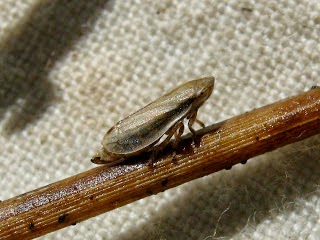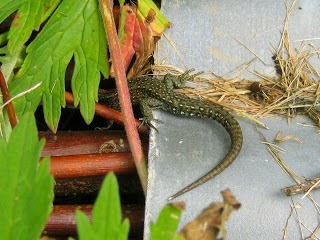A
BioBlitzing we will go...
12
August 2012
Originally
posted in BioList 2013: http://biolist2012.blogspot.co.uk/2012/08/a-bioblitzing-we-will-go.html
“The
time has come”, the Blogger mused,
“To
write of many things:
Of
bugs – and bees – and butterflies –
Of
harvestmen – and – fleas
And
why the weather’s up the spout –
And
what to have for tea.”
(With
apologies to Lewis Carroll)
Hello
my little blog-friend, it’s been a while, hasn’t it? I do hope you and
the family are keeping well. Eek, what to write – or perhaps that should
be ‘how to write’, given the number of mistakes I’m making as I type.
But… less of my personal failings and hang-ups - on with the job-in-hand.
In
the land of BioListing, recording and the generally
wonderful-but-perhaps-a-little-bit-nerdy world in which I’ve chosen to live,
the past few months have been dominated by BioBlitzes – 24-hour events during
which a given space is surveyed in order to find, identify and record as many
wild species as possible*.
The
first such event was the inaugural Tremough Bioblitz, which took place at the
Combined Universities in Cornwall Tremough Campus in Penryn, and was admirably
organised by University of Exeter Centre for Ecology & Conservation
undergraduates. A highly organised event, which was open to the
public for only some of the 24 hours, as a so-called ‘expert’, I’d been
enlisted to lead a number of walks. Despite the best-laid plans, these
turned into just the one walk, with the remainder of the time spent going about
the usual business of wandering around, rummaging here, there and everywhere,
with senses on full alert. Disappointingly, the weather left a little to
be desired, so it was definitely a case of nipping outside between
downpours. It was all a rather hectic yet fun experience, with some new
species to add to the list: aphids, millipedes and plants, and some lovely new
people met. And, needless to say, one of the additional highlights of the
event was the presence of a certain Nick Baker…
The Small
Person with Nick Baker at Tremough BioBlitz
|
Next
up was the third Rosewarne BioBlitz – a thoroughly enjoyable low-key event at
Duchy College, Rosewarne near Camborne, where the usual suspects (plus a
handful of extras) were on hand to get stuck into the job of seeking out all
things wild and wonderful that reside on the extensive college site. For
once, the sun was shining, and we really couldn’t have asked for a nicer day,
encompassing some inspirational botanising, dragonfly- and butterfly-pursuing
antics in the wildlife garden, a relaxed sojourn by the wildlife pond, a group
venture to the site’s outer limits, and some frantic moth-recording by means of
a light and white sheet. Highlights are too numerous to list in full but
include the first ever Common Lizards Zootoca vivipara for the
site, some lovely bugs, and some rather comical Screech Beetles Hygrobia
hermanni.
Then,
the weekend of July 21-22 saw another inaugural event – the Garden BioBlitz:http://www.naturewatched.org/gbb.html A
combination of very little notice and having prior commitments meant that I was
unable to give this the level of attention that I would have liked to.
However, on the Saturday, I did manage to spend a couple of (very hot) hours in
my tiny, tiny jungle before being whisked away to experience the joys of
Lafrowda Day in St. Just in the far, far west (as opposed to simply the far
west), whilst on the Sunday, a far more concerted effort was made in fellow
BioLister Brenda’s larger outdoor space.
What
it lacks in area, our little garden certainly makes up for in species
diversity, so despite only managing a couple of hours of investigating, all
manner of goodies were uncovered. Having a certain inclination towards
the smaller, multi-legged creatures of this world, I took great delight in
observing multiple colonies of five different aphid species, one of which was
new to me: Cavariella pastinacae – found busy at work on the
Parsnip plants leftover from last year’s vegetable-growing efforts. Other
new species included a single Lacehopper Cixius nervosus, a vast
quantity of mines on Aquilegia produced by the dipteran larvae Phytomyza
minuscula, and a previously-unnoticed rust Puccinia pulverulenta on
the omnipresent Broad-leaved Willowherb Epilobium montanum.
 |
Macrosiphum rosae on Teasel Dipsacus fullonum Garden BioBlitz
|
Blitzing
Brenda’s garden proved to be equally (if not more) rewarding, perhaps notably
due to the excitement of finding a thriving population of the Pittosporum
psyllid Trioza vitreoradiata, hanging out, rather appropriately on
Pittosporum bushes. Admittedly, psyllids aren’t or wouldn’t be
everybody’s cup of tea but each to their own, I guess! In addition to my
rather lovely psyllid, I was able to add another new bug to my list, this time
a late instar Field Damsel Bug Nabis ferus, which was merrily
wandering around Brenda’s mini-meadow, as were Common Green Capsids Lygocoris
pabulinus and a good number of bouncy Common Froghoppers Philaenus
spumarius.
A
few unidentified odds and ends (mainly spiders and flies) notwithstanding,
nearly 80 species were recorded for my little garden and about 150 for Brenda’s
– not a bad weekend’s work, especially considering we had no moth trap to hand
and lacked the time to have a really hardcore rummage in the undergrowth, let
alone a decent delve into the soily depths. Who knows how many more
species we might have unearthed!
 |
Common Frog(let) Rana temporaria Garden BioBlitz
|
Then, a mere week later, it was time
for the long-awaited Windmill Farm BioBliz, when BioList members and other
interested parties got together to do their stuff at Windmill Farm Nature
Reserve (CWT/CBWPS) on the Lizard, here in Cornwall. As others have
already produced event retrospectives (see: http://wfarmnaturereserve.blogspot.co.uk/2012/07/bioblitzed.html and http://consideringbirds.wordpress.com/2012/07/31/big-bioblitz-weekend-part-1/ et
al.), I’ll try not to whitter on at length (I know, don’t hold your breath!).
So,
the sun was shining, the tent was packed, some strange cakes had been made, and
off we headed to Lizard Land, with Brenda in tow. Itching to get started,
we unloaded our stuff and took up residence in what was to be our home for the
weekend. It wasn’t long before other participants turned up, although the
Up Country component didn’t make it for about another hour, and at 2pm, it was
time to get started. But where to begin? I’d been eyeing up the
nearby large patch of nettles and thistles, so for me it was easy, even if it
did mean losing my starting companions, who headed off across a field towards
one of the ponds/scrapes. However, my nettle-poking efforts were soon
interrupted by Warden-Andy and the invitation to accompany him in checking the
known Adder Vipera berus sites. How could I resist such
an offer?! After being rewarded with the find of several Adders (all
female) enjoying the warmth provided by sheets of corrugated material, I was
drawn to the allure of the dragonfly pond around the corner, whereupon I was
greeted by the sight of Dragonfly-Steve thigh-deep in the water, busy
collecting dragonfly and damselfly exuviae, which must have numbered in their
hundreds. Rather reluctantly, I managed to tear myself away from the
dragonfly pond and all its glistening winged jewels, and headed off to the
remarkably dry wet woodland, via a meadow alive with grasshoppers, butterflies
and all manner of buzzing insects.
 |
A Froghopper Neophilaenus lineatus Windmill Farm BioBlitz
|
Now,
BioBlitzing certainly takes its toll, and after totting up a good number of
species, reuniting with lost companions and greeting friends from afar, it was
time to head back for a breather and to sort out notes, sort out unidentified
finds, and generally recompose oneself.
After a continuation of much of the same, mainly involving sweeping through vegetation, turning over leaves and beating trees, it wasn’t soon before the sun began to set (rather beautifully) and talk turned rather animatedly, to moth-traps. I’m not entirely sure how many moth-traps were put in place around the site that evening but they numbered at least five. Some rather intrepid BioBlitzers spent most of the night in the vicinity of one particular trap, interspersed with the odd 40 winks every now and again, in an attempt to record moths that decided to drop in for a passing visit only. Despite protestations of low night-time temperatures and moth numbers being low generally, come the morning, there was a good variety of furry, winged beasties on which to feast our eyes.
 | ||
|
Then
it was back out there in an effort to up numbers before our 24 hours were
up. All-in-all, an excellent time seemed to be had by all (even if I did
spend the next couple of days prostrate on the settee, hurting from head to
toe), with 400+ species being recorded. The big question is, when and
where will the next one be? Bring it on, I say!
*For
some general info on BioBlitzes, take a look here: http://www.bnhc.org.uk/home/bioblitz/


Narcolepsy Natural Treatment to help people with narcolepsy cause stays awake during the day. Excessive daytime sleeping pattern is symptoms of narcolepsy.
ReplyDeletehttp://www.herbs-solutions-by-nature.com/Narcolepsy.php